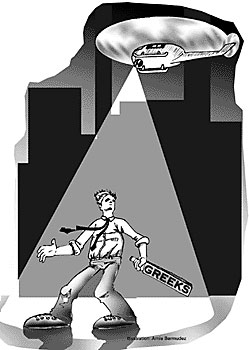
Illustration by Arnie Bermudez
|
|
By Ryan Scalise
Arizona Daily Wildcat
Friday August 29, 2003
It's the beginning of the semester, which means that, among other things, various clubs and organizations are busy seeking new members, as evidenced by the onslaught of tents and booths out at the Mall and inside the recreational center. This also means that fraternity rush, which a good number of students participate in, is underway starting on Sept. 7. However, rush will be different this year, as three of the larger fraternities will not be able to partake in rushing new members.
Sigma Chi had its charter revoked because of a hazing incident where a pledge was left in a freezer for in excess of six hours. Pi Kappa Alpha got its charter taken away because of under-aged drinking violations and excessive physical altercations. Kappa Sigma had its university recognition pulled because of various accounts of sleep deprivation and late night calisthenics.
These are examples that point to a much larger problem on campus, a problem that is usually and exclusively attributed to fraternities and sororities ÷ hazing.
However, other clubs, organizations and honor societies have taken part in hazing activities as well, but are not widely publicized or disciplined compared to cases involving greek organizations.
Kappa Sigma public relations chairman Josh Surridge thinks that it is a good thing that the university is cracking down on fraternity hazing and asserts that the greek system is the perfect place to initiate and foster non-hazing activities.
This is certainly true, because hazing does need to be stopped, but it shouldn't fall on the shoulders of the fraternities and sororities alone; even though they seem like the usual suspects, other organizations are doing it too. So why not also target them with the same ferocity as the greek system?
For example, the Sophos and Chain Gang honor societies both got in trouble for hazing and under-aged drinking. Some of the sports clubs have been pinched for hazing. ROTC, albeit a training ground for the military, also participates in activities which are construed as hazing under the stated university policy.
The university defines hazing as "any intentional, knowing, or reckless act committed by a student, whether individually, or in concert with other persons against another student, and in which both of the following apply: 1) act was committed in connection with an initiation into a university organization 2) the act has substantial risk of physical injury or mental degradation." It is also important to note that hazing has become a punishable crime in the state of Arizona.
The Inter-Fraternity Council, Panhellenic Association, Greeks Advocating the Mature Management of Alcohol, Greek Judicial Board, and ultimately the Dean of Students are the institutions responsible for governing, monitoring and disciplining fraternity and sorority activities.
But where is the oversight of the rest of the clubs and organizations? Who is responsible for governing, monitoring and regulating their activities?
The truth of the matter is that there is no judicial board for any of the non-social greek clubs. There is no one monitoring them as closely as the greek community is monitored and hampered. ASUA does not even have rosters of club members, as opposed to the greek groups, which are required to keep rosters.
There is obviously more oversight required for fraternities and sororities for practical reasons, mainly because most greek organizations have actual houses, which are bigger insurance liabilities. However, whether a club has a house or not, the acts of hazing make the university liable.
According to ASUA, last year there were 428 clubs and organizations, 40 of which were social greek. This means that 388 clubs are virtually unregulated by any sort of disciplinary or regulatory group and could be taking part in hazing activities. Yet they are not the ones getting their recognition pulled or having their gathering places taken away, which is what typically happens to greek organizations.
The closest thing to oversight that these 388 clubs have is their faculty advisor. However, for a majority of clubs on campus, the faculty advisor has little knowledge of the club's activity; faculty advisors are just a formality. This should not necessarily mean that those other clubs shouldn't be monitored with the same aggressiveness and strictness that the greek community is. Fraternities and sororities are simply clubs that are being held to different standards from the rest of the other organizations, societies and clubs on campus. This seems a bit unfair.
Doug Campbell, the student coordinator for organization recognition, said that the non-greek clubs are not held to the same stringent standards as greeks.
Perhaps the university should pay closer attention to the rest of the clubs, and stop worrying about the greek system so much.
Ryan Scalise is a political science senior. He can be reached at letters@wildcat.arizona.edu.
